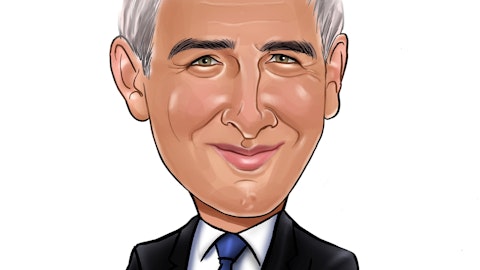Although crude prices have surged since February and many investors think there is more upside left in the black gold, many elite funds are still long airline stocks. Given the strong U.S economy, the fuel-hedging programs that many airlines utilize to lessen volatility from such crude price fluctuations, and the cheap valuations across the industry, it isn’t exactly surprising. In this article, we’ll take a closer look at the top five airlines that elite funds owned at the end of the first quarter, which include Delta Air Lines, Inc. (NYSE:DAL), American Airlines Group Inc (NASDAQ:AAL), United Continental Holdings Inc (NYSE:UAL), Southwest Airlines Co (NYSE:LUV), and Alaska Air Group, Inc. (NYSE:ALK).
Hedge fund sentiment is an important metric for assessing the long-term profitability. At Insider Monkey, we track over 750 hedge funds, whose quarterly 13F filings we analyze and determine their collective sentiment towards several thousand stocks. However, our research has shown that the best strategy is to follow hedge funds into their small-cap picks. This approach can allow monthly returns of nearly 95 basis points above the market, as we determined through extensive backtests covering the period between 1999 and 2012 (see the details here).
#5 Alaska Air Group, Inc. (NYSE:ALK)
– Number of Hedge Funds Long ALK (as of March 31): 33
– Total Value of Hedge Fund Holdings (as of March 31): $1.01 billion
– Hedge Fund Holdings as Percent of Float (as of March 31): 9.80%
In early April, Alaska Air announced that it had agreed to buy Virgin America Inc (NASDAQ:VA) for $2.6 billion or $57 in cash per share. The combination will make Alaska Air the fifth-largest airline by traffic in the U.S and the top airline serving the U.S West Coast. Although the price paid represented a steep premium, many analysts believe Alaska Air can handle it given its strong balance sheet. Alaska Air will also be able to unlock potential annual synergies of $225 million, which could ultimately unlock substantial value for shareholders. Of the 766 actively filing funds in Insider Monkey’s database, 33 held shares of Alaska Air Group, Inc. (NYSE:ALK) at the end of March, versus 32 funds that held shares at the end of 2015.
Follow Alaska Air Group Inc. (NYSE:ALK)
Follow Alaska Air Group Inc. (NYSE:ALK)
Receive real-time insider trading and news alerts
#4 Southwest Airlines Co (NYSE:LUV)
– Number of Hedge Funds Long LUV (as of March 31): 58
– Total Value of Hedge Fund Holdings (as of March 31): $2.68 billion
– Hedge Fund Holdings as Percent of Float (as of March 31): 9.40%
Southwest Airlines Co (NYSE:LUV) was in 58 hedge funds’ portfolios at the end of the first quarter, up by six funds from the close of 2015. Given the company’s strong performance over the years, it isn’t surprising that more funds want to own the company’s shares. Not only are Southwest’s operations low cost, but the company has also been a consistent share repurchaser, with management recently announcing a new $2 billion share repurchase program. The company has also been a dividend raiser of late, with Southwest raising its quarterly dividend to $0.10 per share in mid-May from the previous $0.075 per share. Cliff Asness’ AQR Capital Management held more than 3.4 million Southwest Airlines shares at the end of March.
Follow Southwest Airlines Co (NYSE:LUV)
Follow Southwest Airlines Co (NYSE:LUV)
Receive real-time insider trading and news alerts
We’ll reveal the three most-owned airline stocks as of March 31 among the group of top investors tracked by Insider Monkey on the next page.
#3 United Continental Holdings Inc (NYSE:UAL)
– Number of Hedge Funds Long UAL (as of March 31): 61
– Total Value of Hedge Fund Holdings (as of March 31): $3.38 billion
– Hedge Fund Holdings as Percent of Float (as of March 31): 15.70%
United Continental Holdings Inc (NYSE:UAL) reported better-than-expected earnings for the first quarter, which included EPS of $1.23, which topped estimates of $1.18 per share. The company also bought back $1.5 billion worth of its shares during the quarter, representing an astounding 8% of the float. Despite the buybacks and good earnings, United Airlines’ stock nevertheless fell sharply after the report, mainly due to the company’s worrisome consolidated passenger revenue per available seat mile decline of 7.4% in the first quarter. Given the company’s miniscule trailing P/E of 2.33 and its forward P/E of around 5, many bulls think the bad news has already been priced in. Still, shares are down by 22% year-to-date. Christopher Winham’s Tide Point Capital opened a 450,000-share position in United Continental during the first quarter.
#2 American Airlines Group Inc (NASDAQ:AAL)
– Number of Hedge Funds Long AAL (as of March 31): 61
– Total Value of Hedge Fund Holdings (as of March 31): $1.5 billion
– Hedge Fund Holdings as Percent of Float (as of March 31): 6.10%
Because American Airlines Group Inc (NASDAQ:AAL) doesn’t hedge, the company is more exposed to the rising fuel prices than other airlines. Furthermore, due to the fact that the U.S economy is strong, the company’s labor costs have risen. To retain talent, management has had to institute a new employee profit-sharing program that will pay 5% of pre-tax profit to employees, excluding special items. Some bears fear that low-cost airline competition might eat into American Airlines’ margins too. With all of those factors being in play, there was a notable first quarter decline of 15 in terms of the number of funds in our database long American Airlines. There are still 61 hedge funds long the stock however, as like United Continental, the stock trades at just 5.2-times forward earnings estimates. American Airlines also continues to buy back its stock.
Follow American Airlines Group Inc. (NASDAQ:AAL)
Follow American Airlines Group Inc. (NASDAQ:AAL)
Receive real-time insider trading and news alerts
#1 Delta Air Lines, Inc. (NYSE:DAL)
– Number of Hedge Funds Long DAL (as of March 31): 97
– Total Value of Hedge Fund Holdings (as of March 31): $6.93 billion
– Hedge Fund Holdings as Percent of Float (as of March 31): 18.30%
With 97 elite funds holding shares of the company, Delta Air Lines, Inc. (NYSE:DAL) is somewhat of a consensus top airline pick among hedge funds. Like many of its counterparts, Delta beat earnings expectations for the first quarter, with EPS of $1.32 topping estimates of $1.30. The company also bought back $775 million in stock during the quarter. Unlike its competitors, however, Delta’s passenger unit revenue only declined by 4.6% year-over-year, better than many of its peers. Delta’s management has also shown that they are willing to make tough decisions when its comes to cutting capacity internationally in the second-half of the year, when other competitors haven’t taken that step yet. The more conservative culture could make Delta a better bet in the cyclical airline business in the long run.
Follow Delta Air Lines Inc. (NYSE:DAL)
Follow Delta Air Lines Inc. (NYSE:DAL)
Receive real-time insider trading and news alerts
Disclosure: None





